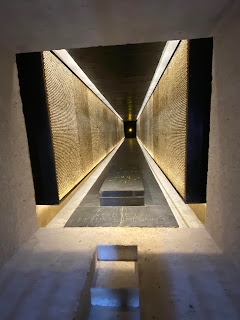Veteran of four wars, four enlistments, four branches: Air Force, Army, Army Reserve, Army National Guard. I am both an AF (Air Force) veteran and as Veteran AF (As Fuck)
Saturday, November 13, 2021
Tragic Accident on a Beautiful Night in Paris
Wednesday, November 10, 2021
A Cathedral and a Holocaust Memorial Share the East End of an Island in Paris
The most famous Cathedral in Paris, Notre Dame, sits the east end of the most famous island in the Seine River, il de la cite.
The grand cathedral is currently in the midst of a many millions of Euros makeover. It will be closed for years.
Behind the soaring cathedral on the very eastern tip of the island is the Holocaust Deportation Memorial. The entire memorial to the 200,000 Jews deported to death camps is underground.


The death camps are listed in blood red.
The view to the east up the Seine River is lovely.
Friday, November 5, 2021
Hypersonic Missiles -- FGFD: Field Guide to Flying Death
Hypersonic missiles recently exploded into the news when China tested their own version of the WMD du jour.
Speed is just one of many ways to classify missiles: from the subsonic Tomahawk cruise missile flying 500mph to the ICBMs breaking free of earth's gravity at more than 15,000 mph. Hypersonic missiles fall in between at fives times the speed of sound around 4,000mph.
As with aircraft, speed is not the only measure of missiles. Intercontinental Ballistic Missiles (ICBMs) are very fast, but since ballistic means without power, they follow a very predictable parabolic flight/glide path to target. They accelerate to 15,000 mph to break free of the atmosphere, then coast over the the north pole to their final destination. The intercept path is very predictable.
At the other end of the scale, a Tomahawk (or other) subsonic cruise missile flies about the same speed as an airliner at around 500mph. They are very small, very light aircraft that are flown to their target. They can evade, maneuver and fly just feet above the ground and hit a target so accurately they can be flown into a particular car in parking lot.
Hypersonic missiles fly five times the speed of sound, in the range of 4,000 mph, in powered flight. They can fly high, low, maneuver, and evade just like a subsonic cruise missile, but fly from New York to Los Angeles in 45 minutes. Planes are very hard to shoot down. A hypersonic missile flies almost twice as fast as the Sidewinder air-to-air missile. It flies faster than the bullets from every US Army rifle and machine gun, faster than 30mm cannon rounds from the gatling gun on the A-10 Thunderbolt II ground attack fighter.
If China has operational hypersonic missiles, as recent news reports suggest, they could threaten other nations, including us, with dangerous, nuclear capable missiles.
If Taiwan becomes Crimea Part II, hypersonic missiles may be the threat that keeps America from defending a nation that has been very loyal to us. President Obama did nothing to stop Putin from seizing Crimea or invading eastern Ukraine. President Trump sold out the Kurds in Syria after one phone call from the Turkish President. Hypersonic missiles might seal the deal that puts Taiwan on the same path as Hong Kong.
Other entires in Field Guide to Flying Death:
And then there's the Sam Fender song, Hypersonic Missile
Thursday, October 28, 2021
Why Doesn't He Care About His Legacy? Why Rush Limbaugh Lied with his (literal) dying breaths
Some very smart people I listen to wondered aloud in the past year why Rush Limbaugh did not care about his legacy? Why did he keep on lying for Trump with his dying breath. Hannah Arendt has an answer.
Most of what is good in public life in our world we inherited from the the Ancient Greece and Rome. In both of those cultures, reputation and legacy and honor were what elevated people. We think of character as something within ourselves. The Greeks saw character as the imprint of the culture on a person. Courage imprinted Heracles--as if Heracles were the coin and courage was the stamp that identified it.
The Greeks and Romans lived in worlds where exile was a punishment as bad as death because true existence was in community. It is from Rome we get the compliment that someone is "A man among men."
In an age of faith, a scoundrel might repent when he knew death was near. That repentance could be true and sincere because the spiritual world was real to everyone in the culture--even those who mostly ignored it.
But we live in an age of the Will. We do not live for reputation, but live to control the future, to impose our desires on the future. In an age such as ours, Hannah Arendt writing about the Will in her book Life of the Mind says:
"...old age consists in a shrinkage of the future dimension, and man's death signifies less his disappearance from the world of appearances than his final loss of a future."
Limbaugh saw his future shrinking and became more desperate to control what time he had left. He wanted to remain relevant to the end. I have known other rich old men who used what time and strength they had left in their 80s or 90s to remain relevant in the places they once had power.
People who live for reputation and contemplation put their lives in order, to use an old phrase, when they know the end is near. Those who lived with a will to power go to death grasping and ignoring every form of goodness.
If C.S. Lewis is right and the doors of Hell lock from the inside, Rush Limbaugh slammed and bolted that door--as an act of Will.
Wednesday, October 27, 2021
Machiavelli on the Problem of Monotheism
This week I listened to a talk by Harvard Professor Harvey Mansfield. You can watch it here or listen to the podcast. One thing that came up which I had never considered before is how important it is that the Church (and the Temple and the Mosque) be separated from the state to have an effective government.
Monday, October 25, 2021
How Many Books are You Reading Now? A Lot.
Monday, October 18, 2021
Colin Powell, an Arduous Road to Great Success
Twelve Windows into History: A Year of Reading History Books in 2025
In 2025, twelve of the fifty books I read were histories. Together they spanned continents, centuries, ideologies, and genres. Some were s...

-
Tasks, Conditions and Standards is how we learn to do everything in the Army. If you are assigned to be the machine gunner in a rifle squad...
-
The Remains of the Day by Kazuo Ishiguro Kazuo Ishiguro’s The Remains of the Day is, on the surface, a beautifully restrained novel about...
-
On 10 November 2003 the crew of Chinook helicopter Yankee 2-6 made this landing on a cliff in Afghanistan. Artist Larry Selman i...




















